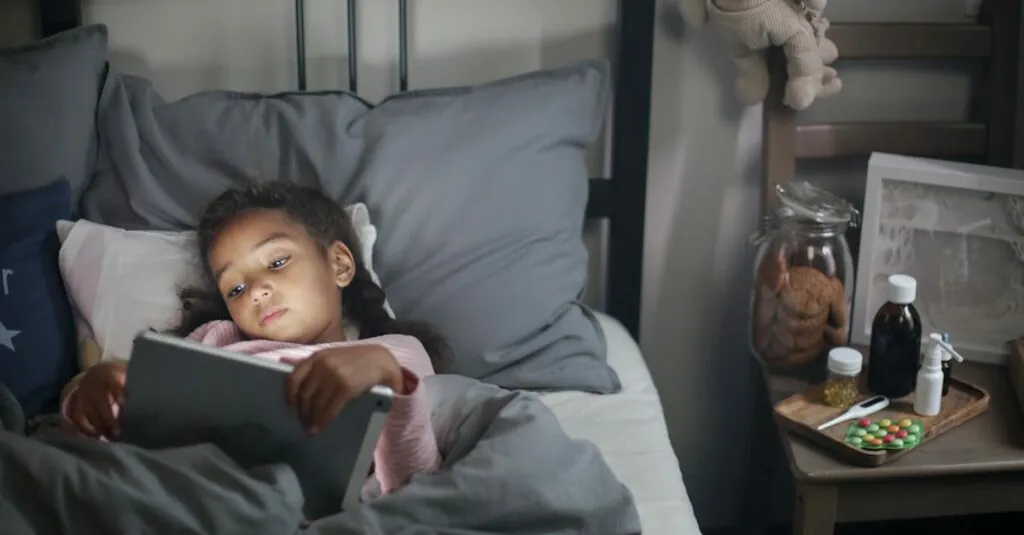Getting kids to sleep can feel like trying to herd cats on a sugar high. Parents often find themselves in a nightly battle, negotiating bedtimes, and dodging requests for one more story or a glass of water. When the usual tricks fail, many wonder if kids sleep medicine might be the secret weapon they need to reclaim their evenings.
But before diving into the world of sleep aids, it’s crucial to understand what’s safe, effective, and appropriate for little ones. With the right information, parents can navigate this tricky terrain and find solutions that promote better sleep without turning bedtime into a circus. So, let’s explore the ins and outs of kids sleep medicine and help those tiny humans (and their exhausted parents) catch some much-needed Z’s.
Table of Contents
ToggleOverview of Kids Sleep Medicine
Parents often seek solutions for their children’s sleep struggles. A variety of sleep medications and supplements exist, but determining the right option requires careful consideration. Common sleep medications for kids include melatonin, antihistamines, and prescription medications. Each type interacts differently with children’s developing bodies.
Melatonin, a hormone naturally produced by the body, can help regulate sleep cycles. Dosages typically range from 0.5 mg to 5 mg, depending on age and individual needs. Antihistamines might induce drowsiness but can cause side effects such as dry mouth and irritability. They aren’t advisable for long-term use.
Prescription medications, including stimulants or sedatives, come with more significant risks. These medications require thorough evaluation by healthcare professionals to ensure safety and efficacy. Pediatricians often suggest behavioral interventions as the first line of treatment before considering medication.
Parents should also keep in mind the possible effects of sleep aids on children. Altered sleep patterns and dependency may arise, emphasizing the need for careful monitoring. Various non-pharmacological strategies can improve sleep practices.
Creating a consistent bedtime routine, limiting screen time, and fostering a calming sleep environment prove beneficial for most children. Such measures might often negate the need for medications altogether. Consulting healthcare providers before introducing any sleep aid ensures the safety and well-being of the child. Parents must prioritize communication and collaboration with professionals, establishing an informed approach to their child’s sleep difficulties.
Common Sleep Disorders in Children
Sleep disorders affect many children, leading to various challenges for families. Understanding these common issues helps promote better sleep health.
Insomnia
Insomnia involves difficulty falling asleep, staying asleep, or waking too early. Children experiencing insomnia may display irritability, difficulty concentrating, or excessive daytime sleepiness. Estimates suggest that about 20% of children face some form of insomnia. Factors contributing to insomnia in kids include anxiety, stress, and irregular sleeping patterns. Behavioral interventions often yield positive results, such as establishing a consistent bedtime routine. Parents can support their children’s sleep by creating a calming nighttime environment, reducing screen time, and addressing underlying issues.
Sleep Apnea
Sleep apnea occurs when breathing repeatedly stops and starts during sleep, leading to fragmented sleep. This disorder affects an estimated 1% to 4% of children and can result in snoring, gasping, or restless sleep. Consequences of sleep apnea include impaired growth, difficulty in school, and potential cardiovascular problems. Common causes include enlarged tonsils or adenoids, obesity, and nasal congestion. Diagnosis typically involves a sleep study to monitor sleep patterns and oxygen levels. Treatment options may involve lifestyle changes, use of CPAP machines, or surgical intervention to remove obstructive tissues. Parents should consult healthcare providers for proper evaluation and management of sleep apnea symptoms.
Types of Kids Sleep Medicine
Parents often explore various types of sleep medicine to find suitable options for their children. Understanding the differences between available medications helps ensure safe and effective use.
Prescription Medications
Prescription medications can provide relief for more severe sleep issues, but they require careful consideration. Healthcare professionals usually prescribe drugs like benzodiazepines or sedative-hypnotics for children with specific sleep disorders. These medications interact with brain chemistry, making them potent but potentially harmful. Risks include dependence and side effects, which emphasizes the need for thorough evaluation by a physician. Parents must weigh the benefits against potential consequences, always prioritizing their child’s safety.
Over-the-Counter Solutions
Over-the-counter solutions often seem tempting for parents seeking quick fixes. Common options include melatonin and certain antihistamines, which induce drowsiness. Melatonin naturally regulates sleep cycles, making it a popular choice for sleep onset difficulties. Antihistamines, while effective, carry side effects like dry mouth and irritability. Parents should approach over-the-counter solutions with caution, understanding that these options may not suit all children, particularly those with unique health conditions. Professional advice remains essential before starting any sleep aid.
Alternative Treatments
Alternative treatments for children’s sleep issues offer parents additional options beyond medication. Understanding these methods empowers them to make informed choices.
Behavioral Therapy
Behavioral therapy focuses on practical strategies to improve sleep without medication. Parents often find that cognitive-behavioral techniques help in managing sleep challenges. This approach includes establishing a consistent bedtime routine, limiting screen time before bed, and creating a calming sleep environment. Positive reinforcement for good sleep habits encourages children to develop healthier patterns. According to research, nearly 80% of children respond positively to behavioral interventions, making this an effective first step for families. Professionals typically recommend working closely with a trained therapist to customize strategies that fit each child’s unique needs.
Natural Supplements
Natural supplements often attract parents looking for milder alternatives to traditional sleep medicine. Melatonin stands out as a widely used option, with studies showing effective results in regulating sleep cycles in children. Dosage typically varies based on age and individual needs, so consulting a professional remains crucial. Magnesium and valerian root also present possibilities for promoting relaxation and improving sleep quality. Each natural supplement comes with its own considerations and potential side effects, making professional guidance essential. By exploring these natural options, parents can find safe and effective ways to enhance their child’s sleep without relying solely on pharmaceutical interventions.
Safety and Side Effects
Safety and side effects are crucial considerations when it comes to kids’ sleep medicine. Many parents worry about the implications of medication on their child’s developing body. Melatonin is generally viewed as safe for short-term use, but side effects can include dizziness, daytime drowsiness, and altered mood. Antihistamines, while sometimes effective for inducing sleep, can cause dry mouth, irritability, and even hyperactivity in some children.
Prescription medications like benzodiazepines carry significant risks, including dependence and withdrawal symptoms. Healthcare professionals often recommend behavioral approaches as a primary strategy before resorting to medications. Behavioral therapies typically focus on sleep hygiene and routines, having shown effectiveness in about 80% of children.
Natural supplements may serve as gentler alternatives. Magnesium can promote relaxation, and valerian root may help with anxiety, but dosages require professional guidance to ensure safety. It’s essential for parents to consult healthcare providers whenever considering any form of sleep aid, including over-the-counter options.
Understanding the potential side effects enables informed decisions about a child’s sleep health. Collaboration with medical professionals also helps address specific concerns or symptoms of sleep disorders. Sleep studies may be necessary for diagnosing issues like sleep apnea, which can lead to serious complications if untreated. Prioritization of safety remains essential as parents navigate their child’s sleep challenges, ensuring that any interventions taken are appropriate and beneficial.
Navigating children’s sleep challenges can be overwhelming for parents. While sleep medicine may seem like a quick fix, it’s crucial to prioritize safety and effectiveness. Behavioral interventions should always be the first approach, as they often yield positive results without the risks associated with medication.
Parents should remain informed about the various options available and consult healthcare professionals for guidance. Whether considering natural supplements or exploring behavioral therapies, a thoughtful approach ensures that children’s sleep needs are met in a safe and supportive manner. Ultimately, fostering a healthy sleep environment can lead to better rest for both children and parents alike.





